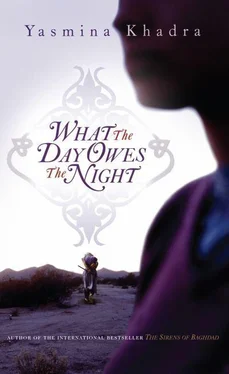He picked up the note, stuffed it back in his pocket and, rubbing his hands together, told us he’d be going back to Oran within the week to do some deals with the GIs.
As the fear subsided and people realised the Americans had not come as conquerors but as saviours, others from Río Salado headed for Oran to see what was going on. Little by little, the last pockets of suspicion died away and people stopped posting guards over the farms and the houses.
André was keyed up. Every day, he jumped in his car and headed for Oran to barter, and after each sortie he would come back and try to impress us with his treasures. We had to go to Oran for ourselves to corroborate the wild stories circulating about the Yanks. Jean-Christophe pestered Fabrice, who pestered his mother to drive us there. Madame Scamaroni was reluctant, but eventually she relented.
We left at dawn. The sun had barely risen above the horizon when we reached Misserghin. Jeeps droned back and forth across the roads and the fields. In the streams, GIs, stripped to the waist, washed themselves, singing loudly. There were broken-down trucks along the verge, their hoods up, surrounded by listless mechanics. By the gates of the city, whole convoys waited. Oran had changed. The GIs teeming through the streets gave the place a carnival air. André had not been exaggerating – there were Americans everywhere: on the boulevards and the building sites, driving their half-tracks through the chaos of camels and tipcarts, dispatching units to the nomads’ douars, filling the air with dust and noise. Officers in civvies honked their horns to cut a path through the mayhem. Others, dressed up to the nines, lounged on the terraces of cafés with lady friends while a gramophone played Dinah Shore. Oran was operating on American time. It was not only Uncle Sam’s troops that had landed, they had brought his culture with them: their ration boxes were crammed with condensed milk, chocolate bars, corned beef, chewing gum, Coca-Cola, Twinkies, processed cheese, American cigarettes and white bread. Local bars were playing American music, and the yaouleds – the shoeshine boys – who had suddenly meta-morphosed into newspaper sellers, dashed from the squares to the tram stops howling ‘The Stars and Stripes’ in some incomprehensible pidgin English. From the pavements came the rustle of magazines ruffled by the breeze: Esquire, The New Yorker, Life. Fans of Hollywood began to adopt the traits of their favourite actors: they swaggered as they walked and curled their lips into a sneer even as the merchants in the souks effortlessly learned to lie and haggle in English.
Río Salado suddenly seemed like a backwater. Oran had taken possession of our souls, its clamour pulsed through our veins, its audacity cheered us. We felt drunk, caught up in the commotion of gleaming avenues and teeming bars, made dizzy by the constant weaving of the carts, the cars, the trams, while the girls, insolent but not flighty, their hips swaying seductively, whirled around us like houris.
There could be no question of going back to Río Salado. Madame Scamaroni headed back alone, leaving us in a room over one of her shops on the Boulevard des Chasseurs and making us promise not to do anything foolish in her absence. Hardly had her car turned the corner than we began our invasion of the city. Oran was ours: the Place des Armes, with its rococo theatre; the town hall, flanked by its colossal bronze lions; the Promenade de l’Étang, the Place de la Bastille, the Passage Clauzel, where lovers met; the ice-cream stands that served the finest lemonade on earth, the lavish cinemas and Darmon’s department stores . . . In its charm and its daring, Oran lacked nothing, every spark became a firework, every joke an uproar, every drink a celebration. Ever generous and impulsive, the city was determined to share every pleasure and despised anything it did not find entertaining. A sullen face could ruin its equanimity, a killjoy sour its mood; it could not bear to see the cloud darken its silver lining. Every street corner was a party, every square a carnival, and everywhere its voice proclaimed a hymn to life itself. In Oran, pleasure was not simply a state of mind; it was a cardinal rule: without it, the whole world was a mess. Beautiful, alluring and well aware of the spell she cast over strangers, Oran was bourgeois in an understated fashion. She needed no fanfare and was convinced that no storm – not even the war – could curb her flight. Oran was a city of airs and graces, people referred to her as la ville américaine, and every fantasy in the world was becoming real. Perched on a clifftop, she gazed out to sea, pretending to languish, a captive maiden watching from a tower for Prince Charming to arrive. She was pleasure itself, and everything suited her.
We were caught up in her spell.
‘Hey, rednecks!’ André Sosa yelled to us.
He was sitting on the terrace of an ice-cream parlour with an American soldier. From the way he waved, it was obvious he was trying to impress. He looked dashing: his hair was scraped back and plastered down with brilliantine, his shoes freshly polished, and his sunglasses hid half his face.
‘Hey, come join us,’ he called, getting up to fetch more chairs. ‘They do the best double-chocolate malt here, and the best snails piquant.’
The soldier shifted over to make room, and watched confidently as we surrounded him.
‘This is my friend Joe,’ said André, delighted to be able to introduce the Yank he had been boasting about. ‘Our American cousin. He comes from a godforsaken hole just like ours. He’s from Salt Lake City and we’re from Río Salado, which means Salt River.’
He threw his head back and gave a forced laugh, delighted by this notion.
‘Does he speak French?’ Jean-Christophe asked.
‘Kind of. Joe says his great-grandmother was French, from Haut-Savoie, but he never really learned the language, he picked it up while he was stationed here in North Africa. Joe’s a corporal. He fought on all the fronts.’
Joe punctuated André’s comments by nodding vigorously, clearly amused to see us all raise our eyebrows in admiration. He shook hands with the four of us and André introduced us as his best friends and the finest stallions in Salt River. Although he was thirty and had been in the wars, Joe still had a boyish face, thin-lipped, with high cheekbones that seemed too delicate for a guy of his build. His keen eye lacked any real acuity and made him look a little simple when he grinned from ear to ear; and he grinned whenever anyone so much as looked at him.
‘Joe’s got a problem,’ André told us.
‘Is he a deserter?’ asked Fabrice.
‘No, Joe’s no coward – he lives for fighting. The problem is, he hasn’t had it off for six months and his balls are so full of spunk he can’t put one foot in front of the other.’
‘Why?’ asked Simon. ‘Don’t they issue hand towels with the rations?’
‘It’s not that.’ André patted the corporal’s hand gently. ‘Joe wants a real bed with red lampshades on the nightstands and a real flesh-and-blood woman who can whisper dirty things to him.’
We all burst out laughing and Joe joined us, nodding his head, his smile splitting his face.
‘Anyway, I’ve decided to take him to a whorehouse,’ André announced, throwing his arms wide to indicate the extent of his generosity.
‘They won’t let you in,’ said Jean-Christophe.
‘They wouldn’t dare refuse André Jiménez Sosa . . . They’re more likely to roll out the red carpet for me. The madame at Camélia is a friend – I’ve put so much money her way, she melts like butter as soon as she sees me. So, anyway, I’m going to take my friend Joe over there and we’re going to fuck their brains out, aren’t we, Joe?’
Читать дальше












